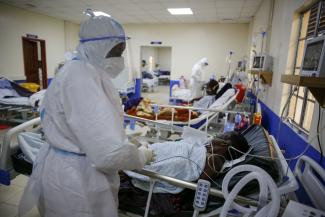Corruption
Medical mystery

Kenya’s fight against the coronavirus pandemic is hampered by persistent shortages of equipment and supplies, including basic materials such as personal protective equipment. Health workers suffer directly from these shortages: as Kenya witnesses a surge in coronavirus cases, medical practitioners have died by the dozens.
Against this backdrop, the international community is trying to help Kenya and other hard-hit African countries. International organisations have sent Kenya more than $ 2 billion worth of aid and grants to help curb the pandemic. Donors include the World Bank, the International Monetary Fund, the World Health Organization and the Jack Ma Foundation, a philanthropic group created by Alibaba founder Jack Ma.
Sadly, however, much of this aid has not reached the doctors, nurses and patients for whom it was intended. Much of it has simply disappeared amidst suspicions of corruption, theft and misallocation of funds.
One notorious case became known as the “Covid-19 millionaires scandal”. In that incident, Kenya’s Ethics and Anti-Corruption Commission unearthed evidence that thieves were selling medical supplies to the Kenya Medical Supplies Authority at three times the market rate.
Similarly, last March a series of 697 packages of medical supplies started arriving at Jomo Kenyatta International Airport, donated by the Jack Ma Foundation. They were to comprise 20,000 test kits, 100,000 masks and 1,000 protective suits and face shields the foundation sent to each African nation in need, including Kenya.
Mysteriously, the packages disappeared shortly after they landed. Media reports said many packages were sold either to black-market buyers or to the Ministry of Health at inflated prices. The Ministry of Transport, charged with clearing imported goods destined for government agencies, blamed Ethiopian Airlines; the airline denied the charge. Six months later the government admitted to only 21 missing packages, and it still cannot say where they went.
This is just one of several high-profile corruption cases to arise since the pandemic started. Overall, an estimated $ 400 million in funds and supplies disappeared in the first six months of the pandemic. The problem is not confined to the coronavirus response. A 2020 government report titled “Road to universal health coverage” says corruption and mismanagement are widespread in the health sector generally, and that county health departments are among the worst offenders.
Transparency International, the international organisation fighting corruption, says Kenya’s corruption problem is worse than the average for the Sub-Saharan region. Together with 44 other civil-society organisations, Transparency International recently published an open letter to government agencies demanding a clean-up of the health sector. The letter is headlined “Corruption in the health sector is negatively affecting realisation of the right to health”.
“The ‘Covid-19 millionaires’ scandal is not an isolated case of corruption. For a long time, the health sector has been facing high instances of corruption,” the group wrote. “Corruption often thrives during times of crisis,” Sheila Masinde, executive director of Transparency International Kenya, added in a press statement. “Even in times of crisis, there are those who aim to profit from others’ misfortune.”
Mahwish Gul is a consultant with a focus on development management. She lives in Nairobi.
mahwish.gul@gmail.com








